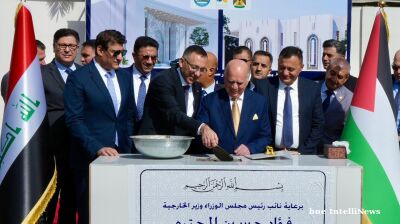Iraq's electoral commission has announced that 23.9% of eligible voters cast ballots by midday in parliamentary elections held on November 11, with 4.795mn people voting, Anadolu Agency reported.
The Permanent Elections Commission said in its midday report that the total number of voters reached 4mn 795,000 and 685 voters by midday.
Polling stations opened at 7am local time, with electronic voting machines set to close at 6pm without extension. Some 7,743 candidates, including 5,496 men and 2,247 women, are competing in the elections.
More than 20mn voters are eligible to cast ballots in 8,703 polling centres distributed across all provinces to elect 329 members of parliament who will be responsible for electing the president and granting confidence to the government.
Mohamed Al Hassan, Special Representative of the UN Secretary-General in Iraq and head of the United Nations Assistance Mission for Iraq (UNAMI), described election day as "a moment of pride" for Iraqi democracy and an embodiment of the people's will to freely and responsibly shape their country's future.
Al Hassan told Al-Jibal platform that wide participation and distinguished organisation by the Independent High Electoral Commission, along with security forces' efforts in securing centres, confirm that Iraq is moving confidently towards consolidating the democratic path and building effective institutions that respond to citizens' aspirations.
He added that the UN is monitoring the electoral process through its teams deployed in all provinces, confirming that elections represent a basic pillar in consolidating trust between citizens and the state.
Al Hassan expressed appreciation for the Independent High Electoral Commission for its efficiency in organisation, and for security forces for their role in securing a stable electoral environment. "What we witness today of commitment and awareness among voters reflects the maturity of the democratic experience in Iraq and confirms that the people's will is the basis for shaping the future," he said.
The current parliamentary session began on January 9, 2022, and continues for four years. According to Iraqi law, legislative elections must be held 45 days before the end of the parliamentary session.
Following the close of polling, workers using tuk-tuks and large minivans began removing the metal frames used to hang candidate photos and slogans from city streets and neighbourhoods, according to Asharq Al-Awsat.
These workers, typically from low-income families living in working-class neighbourhoods, have become accustomed since previous parliamentary sessions to collecting these frames and selling them in the used goods market at prices less than half their original value.
Although the work is small-scale, obtaining the largest possible number of metal frames represents an opportunity to earn noticeable sums compared to their daily incomes, which usually do not exceed IQD 25,000 (approximately $18).
News

Lufthansa reviews airspace safety as it prepares to resume Tehran flights
Germany’s flagship carrier Lufthansa carried out an on-site assessment of Imam Khomeini International Airport (IKA) and Iranian airspace as it prepares to restart flights between Frankfurt and Tehran in early 2026.

Ukraine’s anti-graft bureau targets ex-Zelenskiy business partner in sweeping energy corruption probe
Ukraine’s National Anti-Corruption Bureau (NABU) has carried out a series of high-profile searches in Kyiv, including premises linked to Timur Mindich, a former business partner of President Volodymyr Zelenskiy.

Zelenskiy calls for 27 Patriot systems as Russia steps up missile and drone strikes on Ukraine’s energy grid
Ukrainian president urged Western allies to accelerate the delivery of air defence systems to shield the country from intensifying Russian strikes.

Historic White House summit sees Syria sign key agreements with US
Syrian President Ahmed al‑Sharaa met in the White House with US President Donald Trump, marking the first-ever visit by a Syrian head of state to Washington




